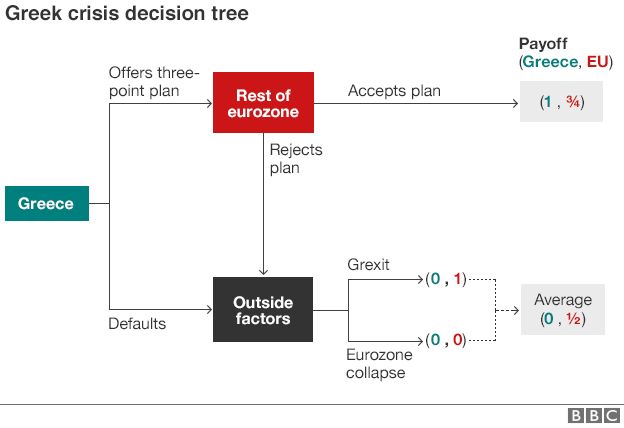Game Theory: It’s All Greek to Me
Concepts in game theory are found to be applicable in a variety of fields and situations. Games such as the Prisoners’ Dilemma have shown to be especially applicable in fields ranging from biology to psychology, and sports to economics. The concepts present in this particular “game” are also highly applicable to events such as the Greek debt crisis in recent months.
Yanis Varoufakis, now the former finance minister of Greece, is no stranger to game theory. Varoufakis studied extensively in the field, and having wrote several books on the subject. Amidst the height of the debt crisis, Varoufakis stepped down, after having adamantly denied to thinking of the Greek situation as a “game” to be won using game theory in the months prior. Still, many economists viewed his – and in conjunction, Greece’s – actions as an exemplification of game theory strategies. Several moves taken by Greece, including their national referendum, were viewed as power plays meant to give them an upper-hand in the negotiations process.

BBC: Greek Debt Crisis, as the Prisoner’s Dilemma
In the chart created by BBC above, the Greek debt crisis is exhibited as a slightly more complex version of the Prisoner’s Dilemma. Clearly, the best option for Greece was to offer their three-point plan, and hope that the Eurozone accepted it. Meanwhile, for the rest of the Eurozone, the best option would be the so-called “Grexit” in which Greece would leave the Eurozone, and there would be no consequences in it. However, due to external factors, it could not necessarily be guaranteed that this would be the outcome, and that the Eurozone would not entirely collapse as a result of Greece’s departure. As is such, the average of the two possible outcomes was only ½ for the Eurozone, and Greece would lose in both scenarios if their plan was not accepted. While they would not benefit as much as Greece, accepting Greece’s plan – or at least, “a” plan – was likely to be more beneficial to all parties than their exit from the Eurozone.
How did the game theory hold up in the end? While the Eurozone did not accept the exact plan Greece had produced, there was indeed a plan created and accepted by the two bodies. Vast reforms were agreed to be made by Greece, and they received yet another bailout, while still being allowed to stay in the Eurozone. For now, Greek has won the game, but only time will tell if they will be able to maintain their current win-streak, or if the rest of the Eurozone will get tired of playing their games.
Sources:
http://www.bbc.com/news/magazine-33254857
http://www.forbes.com/sites/jonhartley/2015/06/03/greece-and-the-troikas-grexit-game-theory/
http://www.cnbc.com/2015/07/07/did-greece-score-an-own-goal-with-game-theory.html
